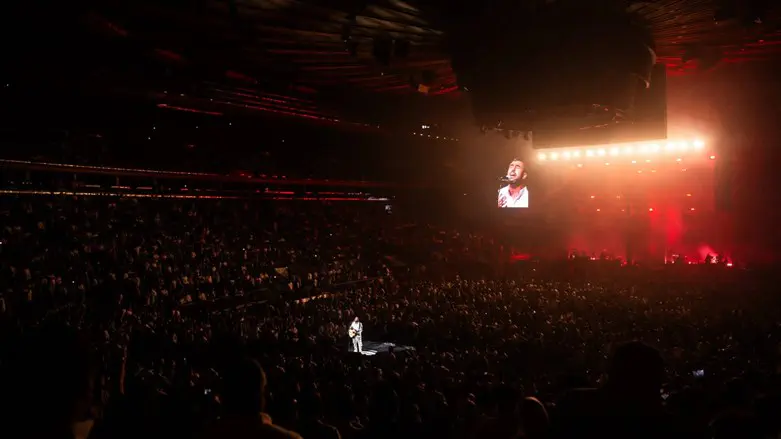
If you told the 20,000 Nazis who rallied in New York’s Madison Square Garden in 1939, that less than 90 years later, the Garden would be full to capacity with Jews singing joyously as they were led by a singer from the independent state of Israel, they probably wouldn’t believe it.
If you told Bob Dylan or the Rolling Stones as they performed in New Haven’s Toad’s Place that one day Ishay Ribo would perform there to a room full of Yale Jewish students and the broader Jewish community, they would probably ask you how to pronounce Ishay Ribo.
Yet this week, Ribo inspired tens of thousands of American Jews with his heartfelt performances from New York to New Haven. Ribo embodies everything antisemites get wrong about Jews. Ribo was born to a family who fled antisemitic persecution in Algeria and Morocco and moved to France. Ribo grew up in Marseilles, and when he was eight years old, they moved to Israel out of a deep religious love for the land of Israel. In Israel, Ribo and his family struggled to find their place, religiously and socially, as he dabbled between the haredi world and general Israeli society. The “white colonizer” antisemitic slur, which became popular on college campuses over the past year, does not work well on Ribo’s North African family.
Ribo is not only a living example of the Jewish people’s vibrancy and diversity, he has also shown American Jews a powerful way forward as they face the greatest wave of antisemitism seen in America in over seven decades. As Jewish Federations, campus Hillels, synagogues, and Jewish intellectuals struggle with the question of how to respond to the current tsunami of hate and antisemitism, Ribo offers a solution that does not run through position papers or Washington think tanks.
Looking around during Ribo’s New Haven concert, I saw Hasidic, Orthodox, Conservative, and Reform Jews all dancing with joy. I saw people who are usually bogged down by news stories about hate and antisemitism celebrating their Jewish lives. I saw countless Star of David necklaces and kippot worn with pride.
This was not the first time I saw Ribo this year. In November, standing with 290,000 Jews in the National Mall in Washington DC, calling for the return of the hostages and supporting Israel, Ribo also came and sang to us all. There too, Ribo was received with love by Jews from across the political and denominational spectrum.
Ribo’s trans-denominational, self-made, and combined diaspora Israeli identity all make it easy to gather around him in song and joy. In combating antisemitism and reviving Jewish life, Jewish institutions must prioritize unifying events that let Jews sing together in a nonjudgmental way and take pride in who we are.
The more common good we find together, the more music we can enjoy with one another, the more we break bread and share together, the more we dance together, the more kindness we can accomplish united, the stronger our community will be.
Just a few days ago, the United States Department of Justice revealed a Russian intelligence plan to stoke division among American Jews. Be it through fake new sites or inflammatory social media responses; the Russians saw a strategic interest in dividing American Jews – just as Iran has placed a great effort into dividing Jews inside Israel.
In the newly exposed document, the Russians wrote: “It is also obvious that the Jewish population of the US is divided with regards to the issues of Ukraine and Israel, just as the population of Israel itself.” Russia knows American Jews are weaker when we are divided.
A musical concert cannot shape our political disagreements, but it can unite us.
Coming together in song, joy, and soulfulness is not only good for the mental health of the Jewish people during these trying times, it literally makes us stronger as a people. Our resiliency, the ability to refocus our attention on what brings us together rather than on what drives us apart, are all boosted by people like Ishay Ribo. They are boosted by culture, inspiration, and remembered the joy that makes us all so proud to be Jewish. Let’s do more of it.
Rabbi Elchanan Poupko is an eleventh-generation rabbi, a teacher, a public speaker, and a writer. He lives with his family in New Haven, Connecticut.